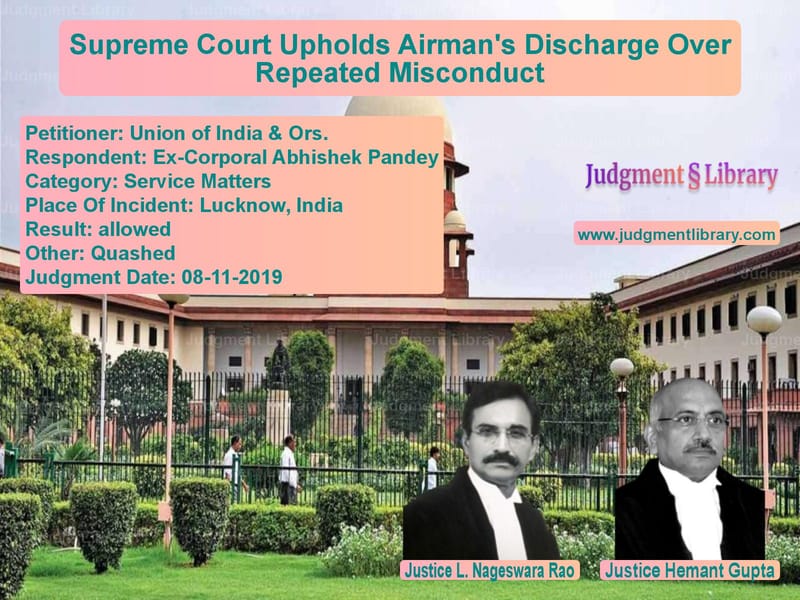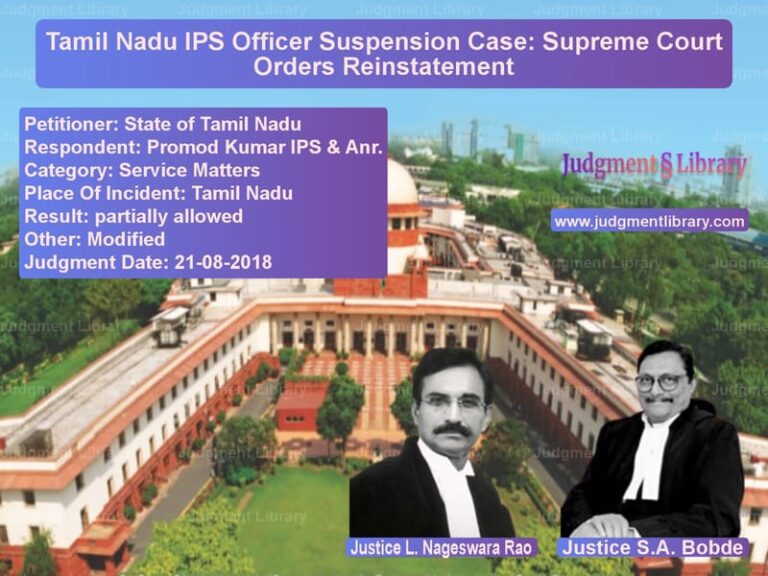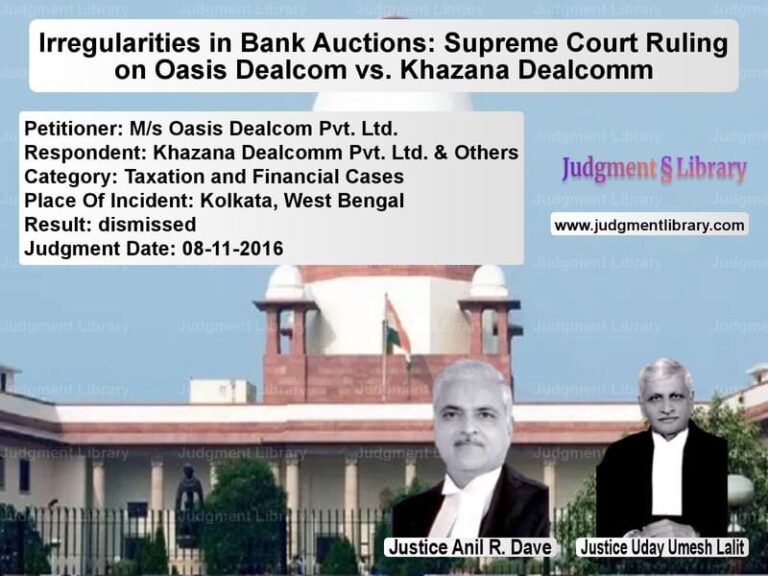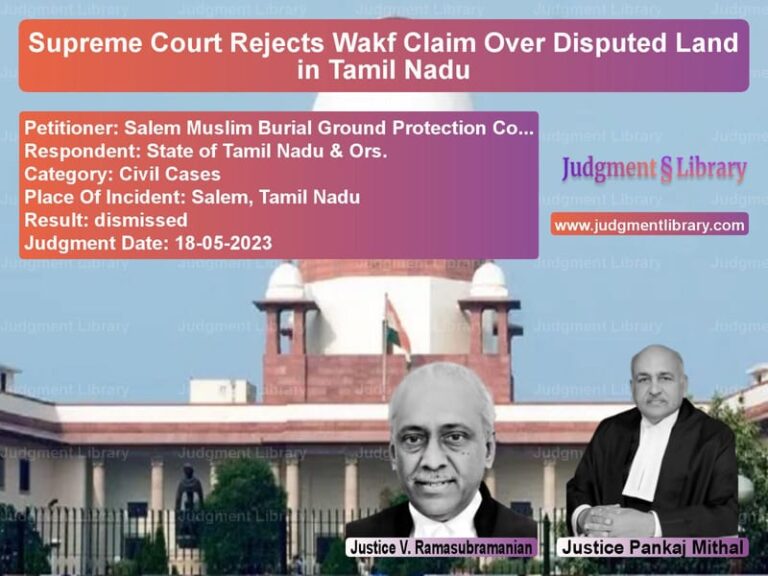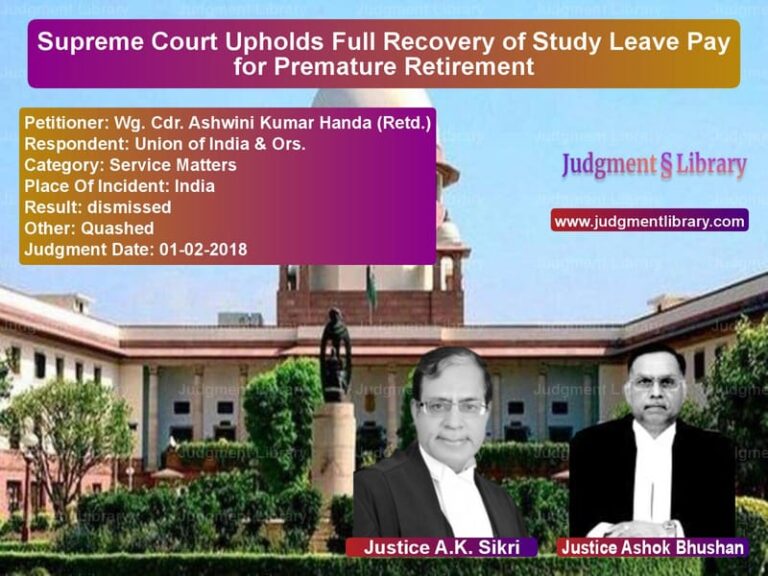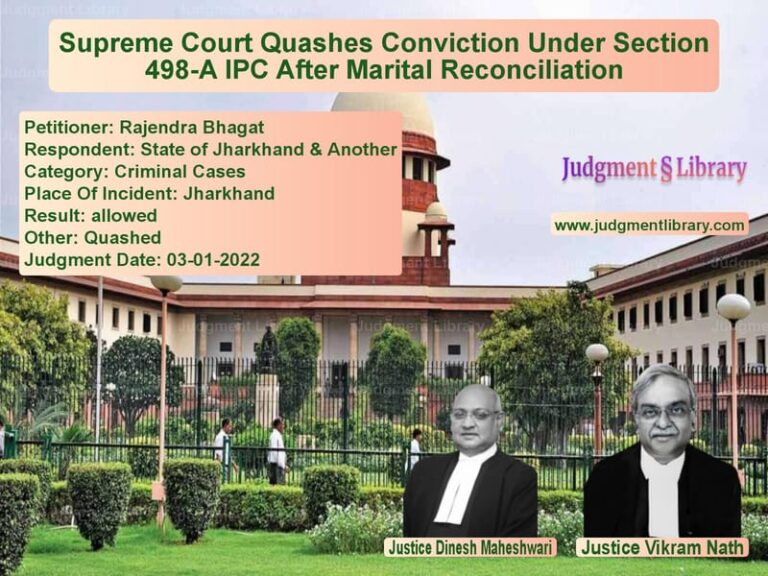Supreme Court Upholds Airman’s Discharge Over Repeated Misconduct
On November 8, 2019, the Supreme Court of India delivered a crucial judgment in the case of Union of India & Ors. vs. Ex-Corporal Abhishek Pandey, addressing the legality of the respondent’s discharge from the Indian Air Force due to habitual misconduct. The Court overturned the decision of the Armed Forces Tribunal (AFT), which had reinstated the respondent and granted him partial back wages.
Background of the Case
The respondent, Ex-Corporal Abhishek Pandey, was enrolled in the Indian Air Force on September 28, 2004. Over the course of his service, he received multiple disciplinary punishments, including three Red Ink entries and four Black Ink entries, for acts of misconduct. The Air Force authorities categorized him as a ‘habitual offender’ and issued a warning on April 18, 2012, cautioning him to reform his behavior.
Despite the warning, the respondent committed another act of misconduct on June 10, 2012, leading to a ‘Severe Reprimand’ on June 13, 2012. Subsequently, a show cause notice was issued on July 11, 2012, seeking an explanation as to why he should not be discharged. The respondent admitted to his misconduct but requested another opportunity for reform. However, the Air Force, following due procedure, approved his discharge on January 17, 2013, under Rule 15(2)(g)(ii) of the Air Force Rules, 1969.
Key Legal Issues
The Supreme Court examined the following crucial legal issues:
- Whether the respondent’s discharge from the Air Force was in accordance with the Habitual Offenders Policy.
- Whether a second warning, as per the policy, was mandatory before passing the final discharge order.
- Whether the decision of the AFT in reinstating the respondent was justified.
Arguments of the Appellant (Union of India)
The Union of India, represented by the Air Force authorities, contended that:
- The respondent had been repeatedly warned about his misconduct but failed to reform.
- The first warning issued on April 18, 2012, was sufficient, and a second warning was not mandatory when a final discharge decision was made.
- The AFT had misinterpreted the Air Force’s Habitual Offenders Policy, which only required a second warning when the competent authority decided to give another opportunity, not when a final discharge was deemed necessary.
Arguments of the Respondent (Ex-Corporal Abhishek Pandey)
The respondent argued that:
- As per the Habitual Offenders Policy of December 16, 1996, he was entitled to a second warning before discharge.
- The Tribunal was correct in setting aside his discharge, as procedural lapses had occurred.
- Despite his past misconduct, he deserved another chance to improve his record.
Supreme Court’s Observations
The Supreme Court critically analyzed the Habitual Offenders Policy and the procedural aspects of the case. The key observations were:
1. Applicability of Second Warning
The Court clarified that a second warning under Paragraph 2(b) of the Policy is necessary only when the competent authority considers affording another opportunity before passing a final discharge order. The judgment stated:
“A second warning letter is required only if the authority decides to defer the discharge and give another chance. In this case, the respondent had already received a warning, and upon subsequent misconduct, the final discharge was lawfully executed.”
2. Adequate Opportunity Given to the Respondent
The Court found that the respondent had been given ample opportunity to reform, but he continued to commit acts of misconduct. The Court noted:
“Despite being given prior notice and an opportunity to explain, the respondent admitted to repeated acts of indiscipline, which made his retention in service untenable.”
3. Validity of the Discharge Order
The Court ruled that the respondent’s discharge under Rule 15(2)(g)(ii) was lawful and within the Air Force’s disciplinary framework. The Court emphasized:
“The discharge was carried out as per the applicable rules and policies, and there was no procedural irregularity.”
Final Judgment
The Supreme Court ruled:
“The judgment of the Tribunal is set aside. The respondent’s discharge from service stands affirmed.”
Accordingly, the Court:
- Allowed the appeals filed by the Union of India.
- Overturned the AFT’s decision reinstating the respondent.
- Ruled that no further back wages or benefits were payable to the respondent.
Legal Implications of the Judgment
This judgment sets an important precedent for disciplinary cases in the Armed Forces:
- Clarity on Habitual Offenders Policy: The ruling confirms that a second warning is required only when a further chance is considered, not when final discharge is decided.
- Strengthening Disciplinary Standards: The judgment upholds the authority of military institutions to enforce discipline and remove personnel who fail to conform.
- Limited Scope for Judicial Review: The Supreme Court reaffirmed that courts should not interfere with internal military discipline unless there is a clear violation of law or fundamental rights.
Conclusion
The Supreme Court’s decision in Union of India vs. Ex-Corporal Abhishek Pandey reaffirms the Armed Forces’ ability to maintain discipline by ensuring that habitual offenders who fail to reform can be lawfully discharged. The ruling ensures that procedural safeguards are followed while also affirming that military regulations must be interpreted in a way that preserves order and discipline within the forces.
Petitioner Name: Union of India & Ors..Respondent Name: Ex-Corporal Abhishek Pandey.Judgment By: Justice L. Nageswara Rao, Justice Hemant Gupta.Place Of Incident: Lucknow, India.Judgment Date: 08-11-2019.
Don’t miss out on the full details! Download the complete judgment in PDF format below and gain valuable insights instantly!
Download Judgment: Union of India & Ors vs Ex-Corporal Abhishek Supreme Court of India Judgment Dated 08-11-2019.pdf
Direct Downlaod Judgment: Direct downlaod this Judgment
See all petitions in Disciplinary Proceedings
See all petitions in Public Sector Employees
See all petitions in Termination Cases
See all petitions in Judgment by L. Nageswara Rao
See all petitions in Judgment by Hemant Gupta
See all petitions in allowed
See all petitions in Quashed
See all petitions in supreme court of India judgments November 2019
See all petitions in 2019 judgments
See all posts in Service Matters Category
See all allowed petitions in Service Matters Category
See all Dismissed petitions in Service Matters Category
See all partially allowed petitions in Service Matters Category

